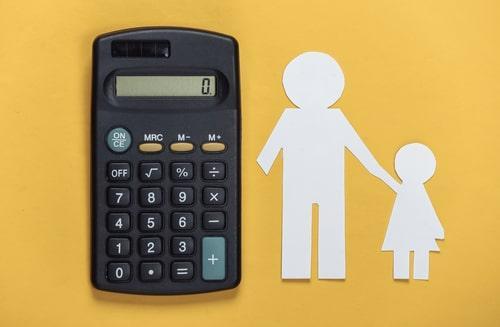Recent Blog Posts
Top 5 Questions About Child Support, Answered
 Parents who are no longer together are still expected to provide financial support to the child. Often, this is accomplished through a child support order. Whether you are a paying parent or the recipient of child support or you want to establish child support for the first time, you may have many different questions. Child support matters can be complicated. Read on to learn answers to some of the most frequently asked questions about child support in Illinois.
Parents who are no longer together are still expected to provide financial support to the child. Often, this is accomplished through a child support order. Whether you are a paying parent or the recipient of child support or you want to establish child support for the first time, you may have many different questions. Child support matters can be complicated. Read on to learn answers to some of the most frequently asked questions about child support in Illinois.
Who Has to Pay Child Support?
In Illinois, child custody involves two major components: the allocation of parental responsibilities and parenting time. Parenting time is the time a parent is responsible for supervising the child and attending directly to the child’s needs. The parent with the greater amount of parenting time is the recipient of child support. The parent with less parenting time pays child support.
How Much Does a Parent Pay?
What is the Mandatory Waiting Period for Divorce in Kane County?
 If you have decided to end your marriage, you may be interested in learning the next steps. Divorce laws vary from state to state and change over time. You may have heard that there is a mandatory waiting period to get divorced in Illinois. Perhaps a well-intentioned friend or family member explained to you that you have to be separated a certain amount of time before you can file for divorce or you read this information on a non-state-specific website.
If you have decided to end your marriage, you may be interested in learning the next steps. Divorce laws vary from state to state and change over time. You may have heard that there is a mandatory waiting period to get divorced in Illinois. Perhaps a well-intentioned friend or family member explained to you that you have to be separated a certain amount of time before you can file for divorce or you read this information on a non-state-specific website.
In 2022, there is not a mandatory waiting period for divorce in Illinois. However, there are situations in which a separation period is needed to prove that the grounds for divorce have been met. Read on to learn more.
Illinois Separation Period Before Divorce
Once a couple has decided to divorce, they usually want the process to start sooner rather than later. If you are eager to get divorced and move on with your life, you may be pleased to learn that Illinois does not have a mandatory waiting period. That being said, one or both spouses must have lived in Illinois for at least 90 days in order to get divorced in Illinois. So, if you recently moved to the state, you may need to wait 90 days to qualify for divorce.
How Does Visitation Work in Kane County, Illinois?
 As a parent, it can be extremely difficult to share your child with an ex. Whether you were married to the other parent for years, or just briefly dated, child custody can be a complicated, emotionally-charged topic. To make the situation even more complicated, child custody laws vary from state to state. In Illinois, child custody is now called the allocation of parental responsibilities. Visitation is called parenting time. If you are an unmarried or divorcing parent, read on to learn how the state handles parenting time and other child-related concerns.
As a parent, it can be extremely difficult to share your child with an ex. Whether you were married to the other parent for years, or just briefly dated, child custody can be a complicated, emotionally-charged topic. To make the situation even more complicated, child custody laws vary from state to state. In Illinois, child custody is now called the allocation of parental responsibilities. Visitation is called parenting time. If you are an unmarried or divorcing parent, read on to learn how the state handles parenting time and other child-related concerns.
Divorcing Parents and Illinois Parenting Plans
If you are getting divorced, you and the other parent will be asked to write up a “parenting plan” or parenting agreement. This document will describe how you plan to divide parenting time, make major decisions about your child’s healthcare and education, and address other important child-related concerns. If you can agree to the terms in the parenting plan, you can submit a joint plan to the court for approval. If you are unable to agree on one or more issues, you will each submit your plans separately to the court.
Will I Have to Take a Parenting Class if I Get Divorced in Illinois and I Have Kids?
 Children are very sensitive to changes in their family. When parents divorce, children may struggle to adjust to a two-home lifestyle or become overwhelmed with emotions. They may act out at school, experience mental and physical health problems, or withdraw from their family and friends.
Children are very sensitive to changes in their family. When parents divorce, children may struggle to adjust to a two-home lifestyle or become overwhelmed with emotions. They may act out at school, experience mental and physical health problems, or withdraw from their family and friends.
Because divorce and other major changes to the family unit are so hard on children, Illinois requires parents involved in family law proceedings to attend a parenting class. Read on to learn more.
Mandatory Parenting Class for Divorcing Parents in Illinois
If you are getting divorced, pursuing a paternity action, or are otherwise involved in a child-related family law dispute, you will likely be required to attend an educational course. The purpose of the course is to teach parents about how family reorganization and related changes affect kids and how to help their children cope with these changes. According to the Illinois Supreme Court, each circuit or county approves of a parenting class. The class must be at least four hours long. Unless good cause is shown, both parents are required to complete the parenting class within 60 days of the initial case management conference. The court has the authority to impose sanctions on any parent who intentionally fails to complete the parenting class. Even if your divorce is uncontested, meaning you and your spouse agree on the terms of the divorce, you will still be expected to complete the course.
How to Get Out of An Abusive Marriage
 Sadly, what is supposed to be a loving relationship can sometimes turn into a relationship based on threats, manipulation, and violence. Domestic violence is shockingly common across the United States. Each minute, approximately 20 people are physically abused by a spouse or romantic partner.
Sadly, what is supposed to be a loving relationship can sometimes turn into a relationship based on threats, manipulation, and violence. Domestic violence is shockingly common across the United States. Each minute, approximately 20 people are physically abused by a spouse or romantic partner.
If you are in an abusive marriage, you are not alone. Read on to learn about some of the strategies that may help you protect yourself and your children during the divorce process.
Remember That the Abuse is Not Your Fault
Victim-blaming is a tactic that many abusive people use to try and manipulate their victims. Your abuser may tell you that his or her behavior is justified because you did something to provoke him or her. Sadly, some abuse victims start to believe this. If you are being physically, mentally, or emotionally abused, it is not your fault. You deserve to be treated with respect.
Should I Try a Trial Separation if My Marriage is Failing?
 Any married person can tell you that marriage takes work. Over the years, many couples find themselves exasperated and considering divorce. Financial stress, child-related concerns, infidelity, and countless other issues can harm a marriage relationship. However, it can be difficult to know when a marriage is truly beyond saving. This is why many married couples agree to a “trial separation” before deciding whether or not to get divorced. If you are thinking about a trial separation, keep the following things in mind.
Any married person can tell you that marriage takes work. Over the years, many couples find themselves exasperated and considering divorce. Financial stress, child-related concerns, infidelity, and countless other issues can harm a marriage relationship. However, it can be difficult to know when a marriage is truly beyond saving. This is why many married couples agree to a “trial separation” before deciding whether or not to get divorced. If you are thinking about a trial separation, keep the following things in mind.
Being Separated and Being Legally Separated Are Two Different Things
The term “separated” is often used to describe a situation in which a married couple is living separately but has not yet begun divorce proceedings. Usually, when couples talk about a trial separation, they are referring to an informal agreement to live separate lives for a certain period of time. This situation should not be confused with a legal separation.
How Can Illinois Equitable Distribution Laws Influence My Divorce?
 Separating finances is often one of the most complicated parts of the divorce process. Because the division of assets and debts can have such a significant impact on spouses’ post-divorce future, it is also often one of the most contentious aspects of the divorce process. If you are getting divorced in Kane County, it is important to understand how marital property is divided according to Illinois law.
Separating finances is often one of the most complicated parts of the divorce process. Because the division of assets and debts can have such a significant impact on spouses’ post-divorce future, it is also often one of the most contentious aspects of the divorce process. If you are getting divorced in Kane County, it is important to understand how marital property is divided according to Illinois law.
Dividing Property and Debts During Divorce
Countless factors influence the complexity of the property division process, including the spouses’ ability to agree. If you and your spouse are on relatively good terms, you may be able to reach a property division settlement outside of court. Your respective lawyers can help you negotiate the terms of your property division arrangement if you and your spouse struggle to reach an agreement on your own. If you are unable to reach an agreement or settlement, the court will determine how to divide property for you. Illinois courts divide marital property according to a principle called “equitable distribution.”
How Can a Kane County Postnuptial Agreement Benefit Me and My Spouse?
 Throughout the past 100 years, the way we think of marriage and divorce has changed dramatically. Divorce was once seen as a taboo. People stayed in unhappy or even abusive marriages indefinitely – even when doing so harmed them or their children. Fortunately, things have changed. As divorce becomes more accepted in society, many married couples are choosing to use prenuptial agreements and postnuptial agreements to protect their financial interests in the event that the marriage does end in divorce. Read on to learn about the potential benefits of a postnuptial agreement, when a postnup is appropriate, and how you can get help with creating a postnuptial agreement.
Throughout the past 100 years, the way we think of marriage and divorce has changed dramatically. Divorce was once seen as a taboo. People stayed in unhappy or even abusive marriages indefinitely – even when doing so harmed them or their children. Fortunately, things have changed. As divorce becomes more accepted in society, many married couples are choosing to use prenuptial agreements and postnuptial agreements to protect their financial interests in the event that the marriage does end in divorce. Read on to learn about the potential benefits of a postnuptial agreement, when a postnup is appropriate, and how you can get help with creating a postnuptial agreement.
Protecting Financial Interests and Planning for the Future
Postnuptial agreements are virtually the same thing as prenuptial agreements, the agreement is just signed after the couple is married. There are countless reasons a couple may choose to sign a postnup. Often, couples choose to sign a postnuptial agreement because they have accumulated significant assets or debts that they want included or excluded from the marital estate. A postnuptial agreement is also a useful tool when a married person has children from a previous relationship. If you have a blended family and you want to ensure your children receive certain assets when you pass away, a postnuptial agreement can help you accomplish this goal.
Crucial Elements to Include in Your DuPage County Parenting Plan
 Whether you are divorced or unmarried, raising a child with an ex can be challenging. Understandably, parents want what is best for their children. When two parents disagree about what is in a child’s best interests, the situation can quickly escalate. Building a parenting plan is the best way to ensure that you and your child’s other parent are on the same page. Parenting plans are also required for parents getting divorced in Illinois.
Whether you are divorced or unmarried, raising a child with an ex can be challenging. Understandably, parents want what is best for their children. When two parents disagree about what is in a child’s best interests, the situation can quickly escalate. Building a parenting plan is the best way to ensure that you and your child’s other parent are on the same page. Parenting plans are also required for parents getting divorced in Illinois.
Required Elements for Illinois Parenting Agreements
Parents who file for divorce in Illinois are asked to submit a parenting plan to the court. If the parents cannot agree on the terms of the parenting plan, the court will have them each submit their own plan separately. Often, parents who disagree about child custody issues are required to attend family law mediation to discuss the issues and work out an agreement. If mediation fails, the case may advance to litigation.
Dissipation of Assets in a Wheaton Divorce Case
 A crucial part of the divorce process involves dividing the spouses’ assets and debts. Depending on your particular situation, you may need to address real estate, vehicles, art and collectibles, business interests, and many other assets. You may also have credit cards, loans, and other debt to deal with during the property division portion of your divorce. One issue that can make the division of assets even more complicated is asset "dissipation." The word dissipation refers to waste, misuse, or destruction of property. In some cases, divorcing spouses may recoup the value of dissipated assets through a dissipation of assets claim.
A crucial part of the divorce process involves dividing the spouses’ assets and debts. Depending on your particular situation, you may need to address real estate, vehicles, art and collectibles, business interests, and many other assets. You may also have credit cards, loans, and other debt to deal with during the property division portion of your divorce. One issue that can make the division of assets even more complicated is asset "dissipation." The word dissipation refers to waste, misuse, or destruction of property. In some cases, divorcing spouses may recoup the value of dissipated assets through a dissipation of assets claim.
What Counts as Dissipation of Assets?
Illinois law states that dissipation occurs when marital property is sold, destroyed, or used for a purpose unrelated to the marriage and in a way that only benefits one of the spouses. The waste of assets must occur during the marriage’s "breakdown" to count as dissipation. The marital breakdown is usually defined as the point at which the couple stops trying to salvage the marriage. For example, if you and your spouse decided to divorce and then he or she destroyed your shared property in revenge, you may have a valid dissipation of assets claim.












